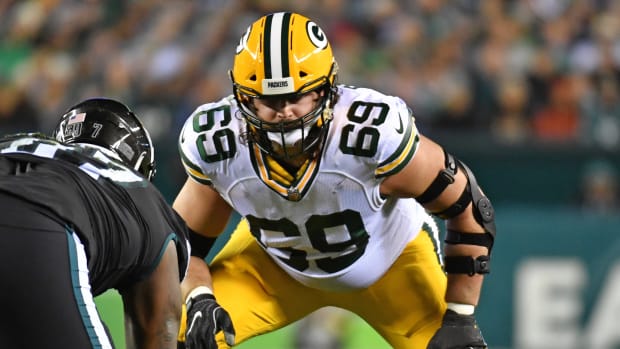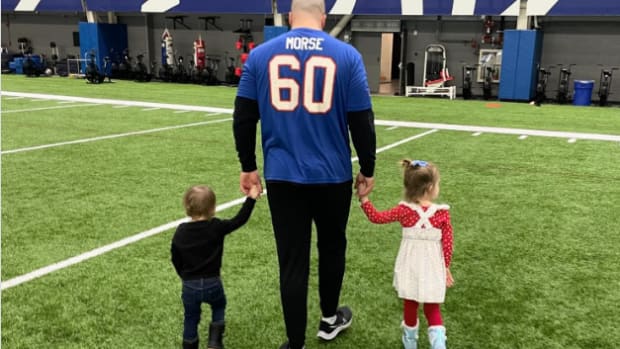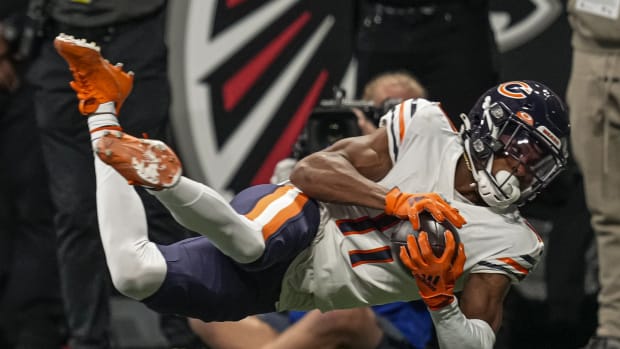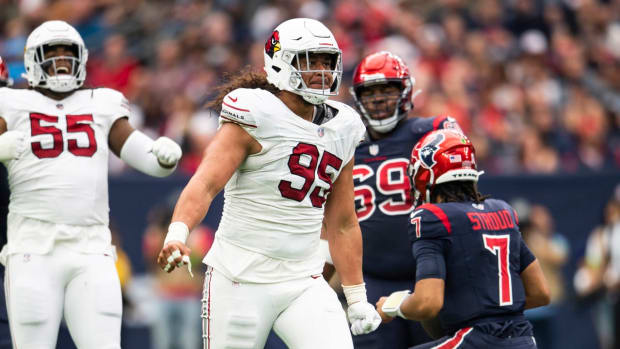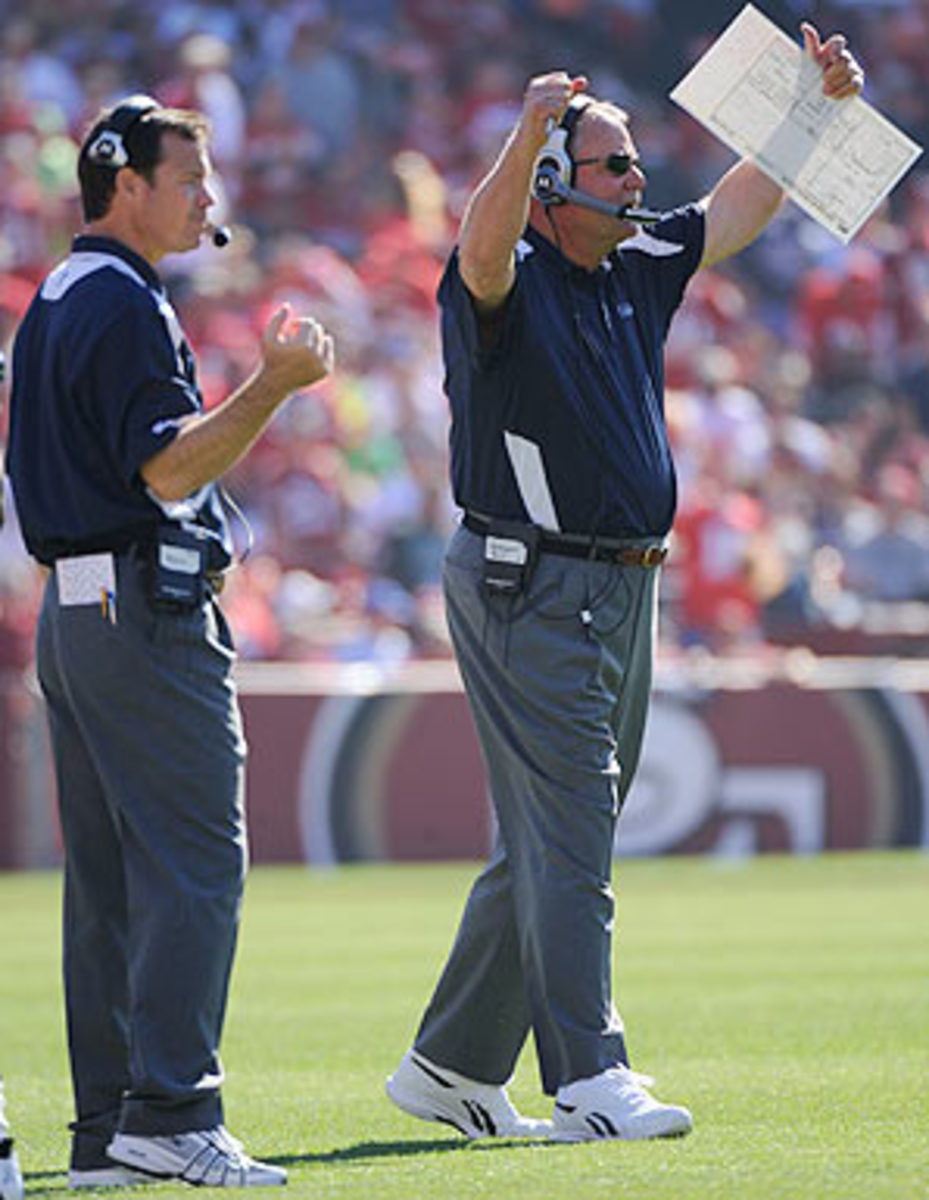
Are coaches in waiting a detriment to Cowboys, Colts and Seahawks?
It's undeniable their seasons have been greatly impacted by a wave of injuries, but does anyone else find it curious that all three of the teams with head coaches in waiting are struggling mightily this year?
Seattle, Indianapolis and Dallas are all defending division champions, and last season they combined to go a gaudy 36-12, earning their playoff berths by comfortable margins. This year, those three are a cumulative 11-14, and all trail in their divisions by at least three games. Seattle (2-6) and Dallas (5-4) are last-place teams, and Indianapolis, at 4-4 and facing a four-game deficit in the AFC South at midseason, is a wild-card contender only.
Again, injuries have played a major role in the sagging fortunes of the Seahawks, Colts and Cowboys, and specifically health at quarterback has been a huge factor. Seattle has played the past month minus Matt Hasselbeck; Indy's slow start has been at least partially a byproduct of Peyton Manning sitting out the entire preseason following two knee surgeries; and Dallas' downward spiral has had plenty to do with Tony Romo missing three games due to a broken finger on his throwing hand.
But also difficult to ignore or accurately quantify is the effect of three previously successful teams that are now playing under the unusual arrangement of having both their current and future head coaches on the same staff:
• Seattle assistant head coach/defensive backs coach Jim Mora was given a five-year contract in early February and named the retiring Mike Holmgren's successor in 2009. The Seahawks, who have made the playoffs a franchise-best five consecutive years, appear headed for their first losing season since 2002.
• In January, the Colts elevated Jim Caldwell to associate head coach/quarterbacks coach, announcing he would succeed Tony Dungy upon Dungy's retirement -- whenever that occurs. Most NFL observers believe Dungy could very well step away from the game after this season. Indy's streak of five consecutive AFC South titles is all but over, and the Colts are in danger of missing the playoffs for the first time since 2001.
• And in Dallas, Cowboys owner Jerry Jones coaxed assistant head coach/offensive coordinator Jason Garrett into passing up head coaching opportunities in Baltimore and Atlanta last offseason by making him the highest paid assistant in NFL history at $3.5 million per year. The clear understanding within the Cowboys organization is Garrett will at some point replace Wade Phillips, who has one year remaining on his contract. Garrett's ascension could come any day now, because with three losses in its past four games, Dallas already has more defeats than it incurred all of last season.
In all cases, the decisions in Seattle, Indianapolis and Dallas to establish a line of succession on the coaching front was both defensible and perhaps even advisable. Mora, Caldwell and Garrett are seen as highly desirable head-coaching candidates, and the Seahawks, Colts and Cowboys did not want to lose them to another organization.
But did those moves have unintended consequences? And is there any hope of putting that particular Genie back in the bottle in Dallas, Indy or Seattle in 2008? While there are other factors involved in the disappointing seasons being turned in by the trio, I can't help but think the particulars of their coaching staff arrangement has played a role in their struggles.
And I'm not alone. I asked a couple of veteran NFL general managers, one in the AFC, one in the NFC, for their assessment.
"I can't recall one, but in the history of the league has there ever been a situation where there's a head coach, and a coach in waiting and that team has had a productive season?'' said the AFC general manager. "I really don't think so. I don't remember one. There has to be something to all three of these teams struggling in this situation. How can it not be at least a factor?
"In any organization, in- or outside of football, where there's a lack of the true lines of authority, it's going to be a problem. Even if it's a situation in the NFL where there's a team that has a coach and a general manager, without either one of them truly being in charge of the decision-making. The players need to know that the line of authority is clean and clear.''
The AFC general manager said that while he admired both what Seahawks president of football operations Tim Ruskell did in naming Mora, and what Colts president Bill Polian did in securing Caldwell, he does not doubt it created some confusion within the teams' locker rooms.
"Players pick up on it if there's not a definite bright line drawn in terms of authority,'' the AFC general manager said. "They respond to that. If it breaks down even 10 percent, that's the 10 percent that gets you beat in this league. It's hard enough competing in this league with the injuries and everything else you're dealing with. When those players can't walk in the room and know this guy is my leader, and will be my leader the next year, it makes it tougher. You don't want your players wondering if this guy is playing out the string, and am I playing for this guy or this guy?''
There's also the potential impact of divided loyalties within a coaching staff to consider. Like players, assistant coaches will turn their attention to the future rather quickly once a season starts to turn sour, focusing on whether they're in the plans of the head coach in waiting, or whether it's time to start worrying about their next job.
"To me, it's certainly a valid point, but the impact is going to be greater on the other assistant coaches than it would be on the players,'' the NFC general manager said. "My gut is that it really wouldn't affect the players much to be in that kind of situation. But it could significantly impact the assistant coaches, particularly the ones that don't have a good relationship with the heir apparent.
"If it has a big impact on your players, you've got the wrong guys on your team anyway. If your players are going to be materially affected by having a coach in waiting on staff, with the future right there, already in the building, you've got the wrong players to begin with.''
Unlike head coaches or players, assistant coaches aren't making big money by NFL standards. They usually work on two-year contracts, and once a season goes badly and a house-cleaning looks likely, they often have to start putting out feelers for new jobs before they're finished with their old ones. That's a difficult environment for any NFL coaching staff to deal with, but a form of that could be emerging in the situations that Seattle, Dallas and Indianapolis find themselves in, given the uncertainty of Dungy and Phillips' futures, and the reality that Mora had a previous assistant staff in his three years as Atlanta's head coach -- with coaches he might remain loyal to.
"I think you really have to be inside each of those places to be able to truly discern whether it's had a material impact on their seasons,'' the NFC general manager said. "But there's no question it's had an impact. It's just how much? Has it really affected how they play and prepare? I just don't know.''
In the case of Mora, Caldwell and Garrett, I've not heard of or seen any indication they have created any distance between themselves and the head coaches they still serve. From all appearances, they have downplayed any potential impact of their role as a coach in waiting. But that doesn't necessarily mean their rather unusual status hasn't been a factor whatsoever in the downturns in Seattle, Indy and Dallas.
"For that coach in waiting, how can you not sit in that seat and at least say 'I wouldn't be doing things the same way as this,' '' the AFC general manager said. "How can you not? It'd be difficult to avoid.''
It's impossible to know the real impact that having a coach in waiting has had on the Colts, Seahawks and Cowboys. Maybe a lot. Maybe a little. But the struggles of all three teams makes me hesitant to dismiss everything as mere happenstance. Sometimes even good ideas can lead to the wrong results.

































